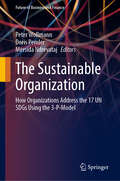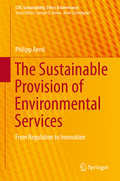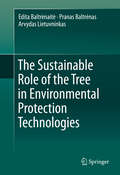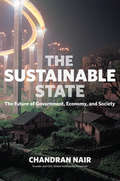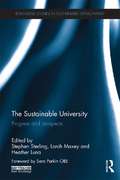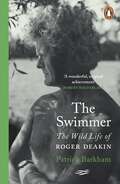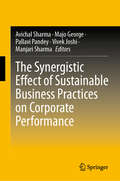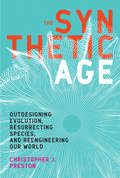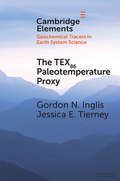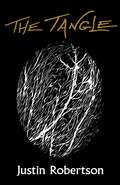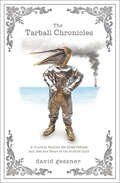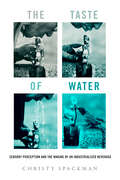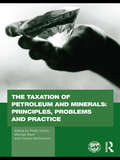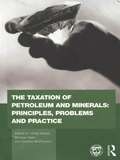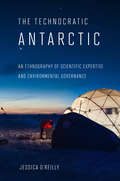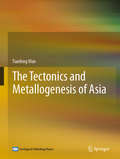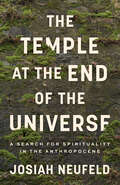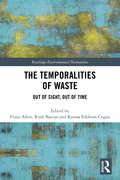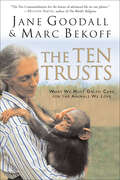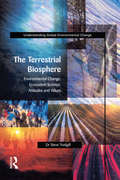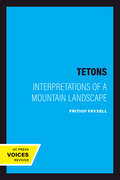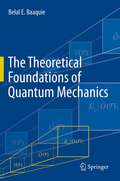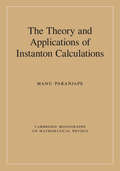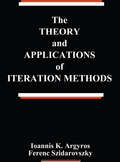- Table View
- List View
The Sustainable Organization: How Organizations Address the 17 UN SDGs Using the 3-P-Model (Future of Business and Finance)
by Peter Wollmann Doris Pemler Mersida NdrevatajThis book explores topics related to sustainability, including the 17 UN Sustainable Development Goals (SDGs) and accountability in various activities. It reflects the complex and diverse landscape of sustainability efforts in organizations and the pursuit of SDGs. It emphasizes that achieving global change and making the world a better place isn't a straightforward, linear process but rather a conglomerate of diverse and interconnected journeys driven by countless parties with individual interests and systemic conditions. Recognizing the impossibility of creating a comprehensive "Big Picture" covering all facets, the authors' ambition is to contribute to the discussion on sustainability and SDG coverage through inspiring use cases. The book illustrates how the Three-Pillar-Model leads to sustainability and SDG coverage. It emphasizes the importance of a strong Sustainable Purpose, mindset transformation in organizations, and cross-silo cooperation for success. The book features contributions from various authors and institutions from all over the world, including (former) leaders of UN agencies, NGOs, enterprises, venture capital funds and angel investor communities, consultancies, universities, historians, system theorists, philosophers and linguists. The chapters also provide diverse perspectives and historical cases to facilitate learning and exploration in this vast field.
The Sustainable Provision of Environmental Services
by Philipp AerniThis book addresses the ability of market-based instruments to improve the sustainable provision of environmental services. The author combines field research and insights from the multi-stakeholder dialogue at the FAO to analyze the gap between the predictions provided by theory and the corresponding outcomes in practice. In particular, the author challenges the theory behind Payments for Environmental Services (PES), a concept derived from neoclassical welfare economics, by demonstrating that PES projects often lack financial sustainability unless local entrepreneurs make use of the resulting new networks to create innovative markets for environmental goods. The author calls for a shift of focus from regulation to innovation in projects and policies designed to improve the provision of environmental services. Its spotlight on the positive social impacts of companies that engage in hybrid PES schemes will make the book appealing to practitioners and policymakers alike.
The Sustainable Role of the Tree in Environmental Protection Technologies
by Edita Baltrėnaitė Pranas Baltrėnas Arvydas LietuvninkasThis monograph describes ways of using trees and their byproducts in environmental protection technologies and methodologies throughout their lifecycles. The tree, the planet's main source of biomass, is an indispensable tool for sustainable technologies, and the authors present a holistic picture of how and why in this volume. The authors describe the indispensable role of the living tree in phytoremediation and biomonitoring and detail the relationship of the tree with its surrounding ecosystem. The direct and indirect relationships of a tree at its vegetation period with various components of the ecosystem (i. e. atmosphere, hydrosphere, lithosphere and soil) contribute to the role of a tree as the medium for integrating aerogenic and edaphic pollutants. Trees phytostabilize pollutants in their organisms and remove them from the soil. The ability of some species of trees to reflect the quality of the environment makes a basis for the environmental bioindication, while quantitative representation of the chemical composition of the surrounding environment allows for the use of trees in biomonitoring. Morphological features of trees (e. g. annual tree rings) allow us to observe environmental conditions in the past and retrospectively evaluate them. This monograph also details how wood products (e. g. biochar, chips, bark, etc. ) of a tree after it has died are used in environmental technologies. Due to the specific morphological form and physical and chemical composition of wood products, they may be used as active materials in the technologies aimed at reducing pollution in an effective and sustainable manner.
The Sustainable State: The Future of Government, Economy, and Society
by Chandran NairThe free-market, limited government development model has been an ecological and social disaster for the developing world. Sustainable and equitable development is only possible with the active involvement of a strong central state that can guide the economy, protect the environment, and prioritize meeting their people's basic needs. In this sure to be controversial book, Chandran Nair shows that the market-dominated model followed by the industrialized west is simply not scalable. The United States alone, with less than five percent of the world's population, consumes nearly a quarter of its resources. If countries in Asia, where 60% of the world's population lives, try to follow the Western lead, the results will be calamitous. .Instead, Nair argues that development must be directed by a state that is willing and able to intervene in the economy . Corporations, which by design demand ever-expanding consumption, need to be directed towards meeting societal needs or otherwise restrained, not unleashed. Development has to be oriented towards the greatest good—clean drinking water for the many has to take precedence over swimming pools for the few. He provides three compelling case studies demonstrating the benefits of such strong state governance and the findings of weak state governance.This will mean rethinking the meaning of concepts like "prosperity," "freedom," and "rights," and whether democracy is always the best way to ensure responsive government—as Nair writes, "A democracy that cannot work to improve the life of its citizens is not better than a non-democracy that can actually improve quality of life." Many people will find these to be challenging ideas, but what Nair offers is a model suited to the realities of the developing world, not the assumptions of the dominant culture.
The Sustainable University: Progress and prospects (Routledge Studies in Sustainable Development)
by Stephen Sterling Larch Maxey Heather LunaThe direction of higher education is at a crossroads against a background of mounting sustainability-related issues and uncertainties. This book seeks to inspire positive change in higher education by exploring the rich notion of the sustainable university and illustrating pathways through which its potential can be realised. Based on the experience of leading higher education institutions in the UK, the book outlines progress in the realisation of the concept of the ‘sustainable university’ appropriate to the socioeconomic and ecological conditions facing society and graduates. Written by leading exponents of sustainability and sustainability education, this book brings together examples, insight, reflection and strategies from the experience of ten universities, widely recognised as leaders in developing sustainability in higher education. The book thus draws on a wealth of experience to provide reflective critical analysis of barriers, achievements, strategies and potential. It critically reviews the theory and practice involved in developing the sustainable university in a systemic and whole institutional manner, including the role of organisational learning.While remaining mindful of the challenges of the current climate, The Sustainable University maps out new directions and lines of research as well as offering practical advice for researchers, students and professionals in the fields of management, leadership, organisational change, strategy and curriculum development who wish to take this work further.
The Swimmer: The Wild Life of Roger Deakin
by Patrick BarkhamBEST BOOK OF 2023 ACCORDING TO THE NEWSTATESMAN AND OBSERVER'The Swimmer is a wonderful, original achievement; teeming with stories, glittering with images, and experimental in form and tone' Robert MacfarlaneRoger Deakin, author of the immortal Waterlog, was a man of many parts: maverick ad-man, cider-maker, teacher, environmentalist, music promoter and filmmaker. But, above all, he was the restorer of ancient Walnut Tree Farm in Suffolk, the heartland where he wrote about all natural life – with rare attention, intimacy, precision and poetry.Roger Deakin was unique, and so too is this joyful work of creative biography, told primarily in the words of the subject himself, with support from a chorus of friends, family, colleagues and lovers. Delving deep into Deakin’s library of words, Patrick Barkham draws from notebooks, diaries, letters and recordings to conjure his voice back to glorious life in these pages.'A rich, strange and compelling work of creative memoir that beautifully honours and elevates the life and work of its subject' Alex Preston, Observer
The Synergistic Effect of Sustainable Business Practices on Corporate Performance
by Manjari Sharma Avichal Sharma Majo George Pallavi Pandey Vivek JoshiThis book explores the intricate relationship between sustainable business practices and economic performance. By examining how companies can achieve financial benefits through the integration of environmental and social responsibility into their core strategies, this book seeks to bridge the gap between environmental and economic concerns. It demonstrates that sustainability is not merely a moral imperative but a strategic economic driver in the modern business landscape. The book provides valuable insights into how companies can align their economic goals with environmental and social responsibilities, leading to long-term financial success. Readers will also benefit from the practical applications and case studies that demonstrate the tangible financial benefits of sustainable business practices. Additionally, the book serves as a resource for implementing sustainability strategies within organizations, making it an indispensable guide for business leaders, policymakers, and academics seeking to navigate the complexities of modern economic and environmental challenges.
The Synthetic Age: Outdesigning Evolution, Resurrecting Species, and Reengineering Our World (The\mit Press Ser.)
by Christopher J. PrestonImagining a future in which humans fundamentally reshape the natural world using nanotechnology, synthetic biology, de-extinction, and climate engineering.We have all heard that there are no longer any places left on Earth untouched by humans. The significance of this goes beyond statistics documenting melting glaciers and shrinking species counts. It signals a new geological epoch. In The Synthetic Age, Christopher Preston argues that what is most startling about this coming epoch is not only how much impact humans have had but, more important, how much deliberate shaping they will start to do. Emerging technologies promise to give us the power to take over some of Nature's most basic operations. It is not just that we are exiting the Holocene and entering the Anthropocene; it is that we are leaving behind the time in which planetary change is just the unintended consequence of unbridled industrialism. A world designed by engineers and technicians means the birth of the planet's first Synthetic Age.Preston describes a range of technologies that will reconfigure Earth's very metabolism: nanotechnologies that can restructure natural forms of matter; “molecular manufacturing” that offers unlimited repurposing; synthetic biology's potential to build, not just read, a genome; “biological mini-machines” that can outdesign evolution; the relocation and resurrection of species; and climate engineering attempts to manage solar radiation by synthesizing a volcanic haze, cool surface temperatures by increasing the brightness of clouds, and remove carbon from the atmosphere with artificial trees that capture carbon from the breeze. What does it mean when humans shift from being caretakers of the Earth to being shapers of it? And in whom should we trust to decide the contours of our synthetic future? These questions are too important to be left to the engineers.
The TEX86 Paleotemperature Proxy (Elements in Geochemical Tracers in Earth System Science)
by Gordon N. Inglis Jessica E. TierneyThe TEX86 paleothermometer is based upon the distribution of archaeal membrane lipids ('GDGTs') in marine sediments. GDGTs are ubiquitous, abundant and relatively resistant to degradation; as such, the TEX86 paleothermometer has been used to reconstruct sea surface temperature (SST) during the Cenozoic and early Mesozoic. We review the principles of the TEX86 proxy and developments made over the last two decades. We also discuss its application as a paleotemperature proxy and explore existing challenges and limitations.
The Talking Earth
by Jean Craighead GeorgeBillie Wind ventures out alone into the Florida Everglades to test the legends of her Indian ancestors and learns the importance of listening to the earth's vital messages.
The Tangle
by Justin Robertson'A writer of fierce and vivid imagination. The Tangle, like Holdstock's classic Mythago Wood and Catlin's The Voorh, taps the deep resonances of the wild wood in the English soul, revering even the stones as living minds, possessed of souls and ancient memories. Visceral stuff from this promising new star of dark fantasy' Michael MoorcockJustin Robertson's debut novel is a trans- dimensional trip into the mysterious knot of nature; a journey into the 'brilliant darkness' where the timeless divine spirit of the 'Tangle' weaves its spell and all mankind's hubris is rendered insignificant by the radically non-human force of phantom ecology. Salvation, revelation and a terrible reckoning dwell in the ancient roots ...A time travelling account of what occurs when unknowable frontiers are breached and humanity finds itself, once again, lost in the woods, THE TANGLE invites us into a grotesque world of eco-horror, echoing with the spirit of writers such as Saki, Ballard, M R James, Ursula Le Guin, Brian Catling and Thomas Ligotti.
The Tarball Chronicles: A Journey Beyond the Oiled Pelican and Into the Heart of the Gulf Oil Spill
by David GessnerThis bestselling account of an environmental disaster’s aftermath offers “a firsthand look at the Gulf after the news cycle ended . . . brilliant.” —Publishers Weekly (starred review)Winner of an ASLE Book Award and a Reed AwardNamed a Top Book from the South by the Atlanta Journal-ConstitutionTraveling the shores of the Gulf from east to west with oceanographers, subsistence fishermen, seafood distributors, and other longtime Gulf residents, environmental advocate and acclaimed author of All the Wild That Remains David Gessner offers a lively, arresting account of the aftermath of the Deepwater Horizon oil spill.With The Tarball Chronicles, Gessner tells a story that extends beyond the archetypal oil-soaked pelican, beyond politics, beyond BP, and beyond other oil-spill accounts. Instead, heart on his sleeve and beer in hand, he explores the ecosystem of the Gulf as a complicated whole and focuses on the people whose lives and livelihoods have been jeopardized by the spill. With his signature combination of intellect, passion, and humor, Gessner asks how much we are willing to sacrifice for the conveniences of modern life.“Gessner has the heart and mind of an investigative journalist.” —Mobile Press-Register
The Taste of Water: Sensory Perception and the Making of an Industrialized Beverage (Critical Environments: Nature, Science, and Politics #15)
by Christy SpackmanHave you ever wondered why your tap water tastes the way it does? The Taste of Water explores the increasing erasure of tastes from drinking water over the twentieth century. It asks how dramatic changes in municipal water treatment have altered consumers’ awareness of the environment their water comes from. Through examining the development of sensory expertise in the United States and France, this unique history uncovers the foundational role of palatability in shaping Western water treatment processes. By focusing on the relationship between taste and the environment, Christy Spackman shows how efforts to erase unwanted tastes and smells have transformed water into a highly industrialized food product divorced from its origins. The Taste of Water invites readers to question their own assumptions about what water does and should naturally taste like while exposing them to the invisible—but substantial—sensory labor involved in creating tap water.
The Taxation of Petroleum and Minerals: Principles, Problems and Practice (Routledge Explorations in Environmental Economics)
by Philip DanielThere are few areas of economic policy-making in which the returns to good decisions are so high—and the punishment of bad decisions so cruel—as in the management of natural resource wealth. Rich endowments of oil, gas and minerals have set some countries on courses of sustained and robust prosperity; but they have left others riddled with corruption and persistent poverty, with little of lasting value to show for squandered wealth. And amongst the most important of these decisions are those relating to the tax treatment of oil, gas and minerals. This book will be of interest to Economics postgraduates and researchers working on resource issues, as well as professionals working on taxation of oil, gas and minerals/mining.
The Taxation of Petroleum and Minerals: Principles, problems and practice
by Michael Keen Philip Daniel Charles McphersonThere are few areas of economic policy-making in which the returns to good decisions are so highâ "and the punishment of bad decisions so cruelâ "as in the management of natural resource wealth. Rich endowments of oil, gas and minerals have set some countries on courses of sustained and robust prosperity; but they have left others riddled with corruption and persistent poverty, with little of lasting value to show for squandered wealth. And amongst the most important of these decisions are those relating to the tax treatment of oil, gas and minerals. This book will be of interest to Economics postgraduates and researchers working on resource issues, as well as professionals working on taxation of oil, gas and minerals/mining.
The Technocratic Antarctic: An Ethnography of Scientific Expertise and Environmental Governance
by Jessica O'ReillyThe Technocratic Antarctic is an ethnographic account of the scientists and policymakers who work on Antarctica. In a place with no indigenous people, Antarctic scientists and policymakers use expertise as their primary model of governance. Scientific research and policymaking are practices that inform each other, and the Antarctic environment—with its striking beauty, dramatic human and animal lives, and specter of global climate change—not only informs science and policy but also lends Antarctic environmentalism a particularly technocratic patina.Jessica O'Reilly conducted most of her research for this book in New Zealand, home of the "Antarctic Gateway" city of Christchurch, and on an expedition to Windless Bight, Antarctica, with the New Zealand Antarctic Program. O’Reilly also follows the journeys Antarctic scientists and policymakers take to temporarily “Antarctic” places such as science conferences, policy workshops, and the international Antarctic Treaty meetings in Scotland, Australia, and India. Competing claims of nationalism, scientific disciplines, field experiences, and personal relationships among Antarctic environmental managers disrupt the idea of a utopian epistemic community. O’Reilly focuses on what emerges in Antarctica among the complicated and hybrid forms of science, sociality, politics, and national membership found there. The Technocratic Antarctic unfolds the historical, political, and moral contexts that shape experiences of and decisions about the Antarctic environment.
The Tectonics and Metallogenesis of Asia
by Tianfeng WanThe purpose of this book is to provide a review of tectonic outlines of the Asian continent, metallogenesis rules of 242 large deposits or fields in 67 tectonic units of 6 tectonic domains in the Asia, and guidelines for the mining companies to effectively prospect the large deposits in the Asia in future. The main contents include the tectonic evolution of every tectonic unit in Asia at different geological periods, the mechanism of growth and intraplate deformation of the Asian continental lithosphere, the lithospheric types of the Asian continent, and relationship between tectonic evolution and mineralization process in the Asian continent.
The Temple at the End of the Universe: A Search for Spirituality in the Anthropocene
by Josiah NeufeldA journalistic memoir by a lapsed evangelical Christian that examines how the ecological crisis is shifting the ground of religious faith. Our species is leaving scars on the earth that will last for millennia. How has religious ideology helped bring humanity to the brink of catastrophe? What new expressions of faith might help us respond with grace, self-sacrifice, and love? What will spark our compassion, transcend our divisions, and spur us to action? Josiah Neufeld explores how the interlocking crises of climate change have shifted the ground of religious faith on a quest that is both philosophical and deeply personal. As the son of Christian missionaries based in Burkina Faso, Neufeld grew up aware of his privilege in an unjust world. His faith gave way to skepticism as he realized the fundamental injustice underpinning evangelical Christianity: only a minority would be saved, and the rest would be damned. He was left, though, with an understanding of how people’s actions are influenced by spiritual motives and religious convictions, and of how a framework of faith can counter one’s sense of personal powerlessness. The Temple at the End of the Universe is the rallying cry for a new spiritual paradigm for the Anthropocene.
The Temporalities of Waste: Out of Sight, Out of Time (Routledge Environmental Humanities)
by Ruth Barcan Fiona Allon Karma Eddison-CoganThis book investigates the complex and unpredictable temporalities of waste. Reflecting on waste in the context of sustainability, materiality, social practices, subjectivity and environmental challenges, the book covers a wide range of settings, from the municipal garbage crisis in Beirut, to food rescue campaigns in Hong Kong and the toxic by-products of computer chip production in Silicon Valley. Waste is one of the most pressing issues of the day, central to environmental challenges and the development of healthier and more sustainable futures. The emergence of the new field of discard studies, in addition to expanding research across other disciplines within the social sciences, is testament to the centrality of waste as a crucial social, material and cultural problem and to the need for multi- and transdisciplinary approaches like those provided in this volume. This edited collection seeks to develop a framework that understands the material properties of different kinds of waste, not as fixed, stable or singular but asdynamic, relational and often invisible. It brings together new and cutting-edge research on the temporalities of waste by a diverse range of international authors. Collectively, this research presents a persuasive argument about the need to give more credence to the capacities of waste to provoke us in materially and temporally complex ways, especially those substances that complicate our understandings of life as bounded duration. This book will be of great interest to students and scholars of the environmental humanities, cultural studies, anthropology and human geography.
The Ten Trusts: What We Must Do to Care for The Animals We Love
by Marc Bekoff Jane GoodallWorld-renowned behavioral scientists Jane Goodall and Marc Bekoff have set forth ten trusts that we must honor as custodians of the planet. They argue passionately and persuasively that if we put these trusts to work in our lives, the earth and all its inhabitants will be able to live together harmoniously. The Ten Trusts expands the concept of our obligation to live in close relationship with animals -- for, of course, we humans are part of the animal kingdom -- challenging us to respect the interconnection between all living beings as we learn to care about and appreciate all species.The world is changing. We are gradually becoming more aware of the damage we are inflicting on the natural world. At this critical moment for the earth, Goodall and Bekoff share their hope and vision of a world where human cruelty and hatred are transformed into compassion and love for all living beings. They dream of a day when scientists and non-scientists can work together to transform the earth into a place where human beings live in peace and harmony with animals and the natural world.Simple yet profound, The Ten Trusts will not only change your perspective regarding how we live on this planet, it will establish your responsibilities as a steward of the natural world and show you how to live with respect for all life.
The Terrestrial Biosphere: Environmental Change, Ecosystem Science, Attitudes and Values (Understanding Global Environmental Change)
by Steve TrudgillTerrestrial Biosphere tries to pose the questions which underlie the many-sided debate of how to respond to and influence change: How should we view nature? What do we do for the best - how should we act - what are we trying to achieve and what should we be guided by?In doing so the book introduces and attempts to analyse not only scientific aspects of the debate but also cultural attitudes and values: the notions of ecosystem stability are now challenged and it is also clear that ecosystems are renewable but not repeatable. It finds that prescriptive 'solutions' based on current constructs may not be adequate. Feeling that analysis should lead to advocacy, the author believes that if we can't improve predictability, we have to increase adaptability which means that ecological and social capacity building should be advocated. This is seen in terms of concepts, institutions, attitudes and values which allow for a plurality of meanings and which can cope with surprise and unforeseen change - and which also facilitates responses to change.
The Tetons: Interpretations of a Mountain Landscape
by Fritiof FryxellThis title is part of UC Press's Voices Revived program, which commemorates University of California Press’s mission to seek out and cultivate the brightest minds and give them voice, reach, and impact. Drawing on a backlist dating to 1893, Voices Revived makes high-quality, peer-reviewed scholarship accessible once again using print-on-demand technology. This title was originally published in 1938.This title is part of UC Press's Voices Revived program, which commemorates University of California Press’s mission to seek out and cultivate the brightest minds and give them voice, reach, and impact. Drawing on a backlist dating to 1893, Voices Revived</DIV
The Theoretical Foundations of Quantum Mechanics
by Belal E. BaaquieThe Theoretical Foundations of Quantum Mechanics addresses fundamental issues that are not discussed in most books on quantum mechanics. This book focuses on analyzing the underlying principles of quantum mechanics and explaining the conceptual and theoretical underpinning of quantum mechanics. In particular, the concepts of quantum indeterminacy, quantum measurement and quantum superposition are analyzed to clarify the concepts that are implicit in the formulation of quantum mechanics. The Schrodinger equation is never solved in the book. Rather, the discussion on the fundamentals of quantum mechanics is treated in a rigorous manner based on the mathematics of quantum mechanics. The new concept of the interplay of empirical and trans-empirical constructs in quantum mechanics is introduced to clarify the foundations of quantum mechanics and to explain the counter-intuitive construction of nature in quantum mechanics. The Theoretical Foundations of Quantum Mechanics is aimed at the advanced undergraduate and assumes introductory knowledge of quantum mechanics. Its objective is to provide a solid foundation for the reader to reach a deeper understanding of the principles of quantum mechanics.
The Theory and Applications of Instanton Calculations (Cambridge Monographs on Mathematical Physics)
by Manu ParanjapeInstantons, or pseudoparticles, are solutions to the equations of motion in classical field theories on a Euclidean spacetime. Instantons are found everywhere in quantum theories as they have many applications in quantum tunnelling. Diverse physical phenomena may be described through quantum tunnelling, for example: the Josephson effect, the decay of meta-stable nuclear states, band formation in tight binding models of crystalline solids, the structure of the gauge theory vacuum, confinement in 2+1 dimensions, and the decay of superheated or supercooled phases. Drawing inspiration from Sidney Coleman's Erice lectures, this volume provides an accessible, detailed introduction to instanton methods, with many applications, making it a valuable resource for graduate students in many areas of physics, from condensed matter, particle and nuclear physics, to string theory.
The Theory and Applications of Iteration Methods (Systems Engineering Ser. #4)
by Ferenc Szidarovszky Ioannis K. ArgyrosThe Theory and Applications of Iteration Methods focuses on an abstract iteration scheme that consists of the recursive application of a point-to-set mapping. Each chapter presents new theoretical results and important applications in engineering, dynamic economic systems, and input-output systems. At the end of each chapter, case studies and numerical examples are presented from different fields of engineering and economics. Following an outline of general iteration schemes, the authors extend the discrete time-scale Liapunov theory to time-dependent, higher order, nonlinear difference equations. The monotone convergence to the solution is examined in and comparison theorems are proven . Results generalize well-known classical theorems, such as the contraction mapping principle, the lemma of Kantorovich, the famous Gronwall lemma, and the stability theorem of Uzawa. The book explores conditions for the convergence of special single- and two-step methods such as Newton's method, modified Newton's method, and Newton-like methods generated by point-to-point mappings in a Banach space setting. Conditions are examined for monotone convergence of Newton's methods and their variants. Students and professionals in engineering, the physical sciences, mathematics, and economics will benefit from the book's detailed examples, step-by-step explanations, and effective organization.
